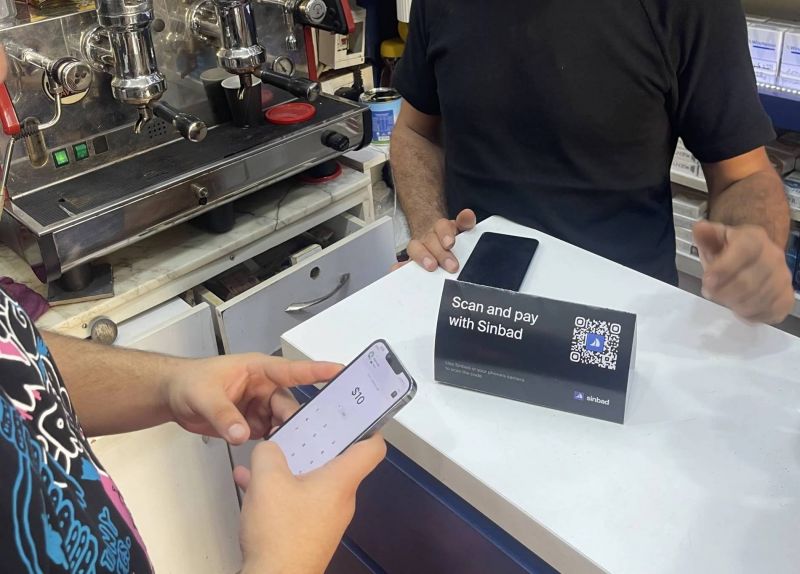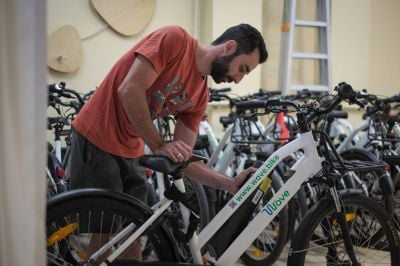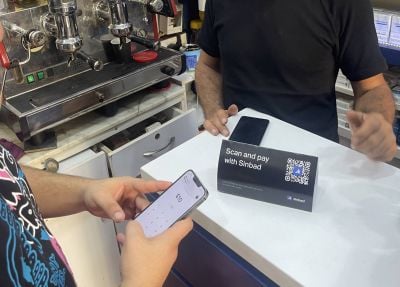
People using the Sinbad app. (Courtesy of: Reda Hussein)
Last month, Lebanese-Canadian Reda Hussein was scouring the small shops on Monot Street in Beirut. He was looking for new business partners to expand the network for his payments application, Sinbad. Hussein had been doing this two or three times a week for almost a month and had already visited all the shops in Hamra and Sodeco.
If successful, the app could provide a new workaround for online payments amid a virtually cash-only economy in Lebanon, wrought by the country’s financial crisis.
The platform, which officially launched in Lebanon on Aug. 15, was co-founded with three other entrepreneurs — Maseh Hadaf, Shareef Hadid and Simon Dorvil — all Canadian, but of Afghan, Iraqi and Haitian origin.
According to Hussein, Sinbad is an app for “storage, payment and funds transfer” and is based on “blockchain technology, which enables transactions to be carried out free of charge.” In order to reassure customers about the value of their assets, since cryptocurrencies on similar apps, such as Bitcoin, are generally associated with very high volatility, the founders say they chose instead to use a “stablecoin,” a digital currency that is theoretically pegged to the dollar. Though there are numerous “stablecoins,” including Tether (USDT) — which is the most widely used in Lebanon — “we only use the USDC, whose peg to the dollar is considered to be the most reliable,” adds Hussein.
Lebanese and Afghan banking crises
The idea for Sinbad was born in the wake of the Afghan government’s collapse in August 2021 and the subsequent closure of banks, which prevented people from accessing or transferring their funds.
Maseh Hadaf discovered that a friend, who ran an online school for Afghan girls, was still relying on cryptocurrencies.
But the team preferred to launch its service in another country — one with similar problems but a more promising market.
“Lebanon is one of the biggest receivers of cryptocurrencies in the region. We found it more appropriate to launch and test a service there that offers financial services that bypass banks,” says Hussein.
The co-founders — two software engineers, a product manager and a sales operations manager — then set about building their platform. “Nothing is outsourced, and that allows us to reduce our expenses,” says Hadaf.
For the time being, the team can count on $100,000 worth of private investment and a $30,000 contribution obtained after being selected as one of the four finalists in the Creative Destruction Labs blockchain program in Canada.
Sinbad is monitored by Lebanese-Canadian investor Jean Amiouny, co-founder and CEO of Shakepay, a Canadian financial platform.
‘Non-custodial wallet’
A month after being rolled out, Sinbad already has more than 1,000 users in Lebanon — both businesses and individuals. “Last week, we recorded more than 400 transactions on our platform and we hope that this number will increase rapidly,” says Hussein. “All transactions are carried out free of charge thanks to the blockchain,” he adds.
Unlike other digital wallets, Sinbad does not have a license from Banque du Liban (BDL), as such a license simply does not yet exist for a cryptocurrency wallet.
Hussein maintains that, unlike other similar companies, Sinbad does not “take possession” of users’ funds. “Our users are, at all times, the sole holders of their own funds, deposited in a non-custodial wallet,” he says. “What Sinbad does is that it offers an easy-to-use platform that enables instant transfers and payments.”
Still, Hussein says the start-up is working closely with BDL to put in place a regulatory framework for the use of cryptocurrencies in Lebanon.
In the meantime, Lebanese banks cannot allow their customers to use their payment cards to acquire cryptocurrencies, and Sinbad users in Lebanon are currently only able to buy USDC in cash from around 15 physical shops (the app’s founders hope to have 200 by the end of the year).
Sinbad charges a one percent commission for these transactions and for withdrawals, which, according to Hussein, “is much lower than the fees charged by other solutions available today,” such as money exchangers and traditional digital wallets.
Lebanese and regional expansion
By the end of the year, Sinbad’s founders hope to enable payments in most small- and medium-sized businesses in Beirut.
“We are currently looking for businesses in high-traffic areas within Beirut. After that, in the near future, we plan to expand our presence in other major cities, such as Jounieh, Jbeil and Tripoli,” says Hussein.
In order to strengthen its local presence, the start-up, based in Toronto, plans to set up shop in one of Beirut’s coworking spaces and hire several sales representatives.
The co-founders then plan to develop their payment network in other countries in the region with strong cash economies, such as Egypt, Iraq and Turkey, for which it plans a larger round of financing.
This article was originally published in French in L’Orient-Le Jour. Translation by Joelle El Khoury.
- A culinary journey from Beirut to Brussels cooks up tradition, love and teta's recipes
- In Tripoli’s Bab al-Tabbaneh and Jabal Mohsen, ex-rival fighters light up former frontlines with solar energy
- Savvy Element: Finding a niche in the local self-care and home-care market, despite Lebanon’s crisis

